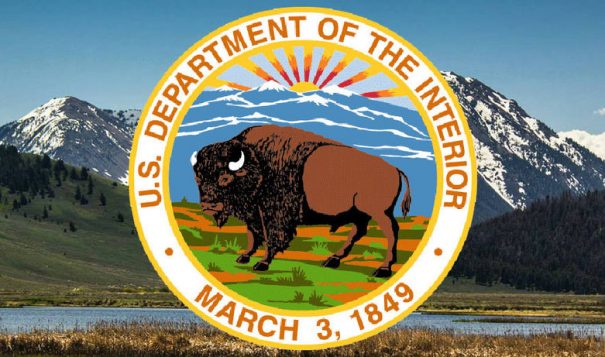Secretary Zinke Approves the Shawnee Tribe’s Fee-to-Trust Application for a Gaming Facility
 U.S. Department of the Interior
U.S. Department of the Interior
Project will bring in $30M in annual revenue and create 200 permanent jobs
OKLAHOMA CITY, Okla. – At a signing ceremony, U.S. Secretary of the Interior Ryan Zinke approved the Shawnee Tribe’s application to put 102.98 acres of land in Guymon, Texas County, Oklahoma, into federal Indian trust status for gaming. The Shawnee Tribe proposes to develop a 42,309-square foot gaming facility on the site comprised of a 20,206-square foot gaming floor, a restaurant, retail space, and office spaces for the Shawnee Tribe Gaming Commission. When completed, the project is expected to generate a $30 million annual impact for the local economy, including creating 200 permanent jobs. The federally recognized tribe, landless for well over 160 years, is headquartered in Miami, Okla., and has approximately 2,500 members.
“One of my top priorities for the Department of the Interior is to make tribal sovereignty meaningful, and that includes providing the basis for tribes to build and strengthen their economies,” Secretary Zinke said. “This gaming facility will create 200 jobs and bring in $30 million annually to the Tribe.”
“I want to thank Secretary Zinke for approving the Shawnee Tribe’s application to put land into trust, which will provide the Shawnee people with their first land base in well over a century,” said Shawnee Tribe Chief Ron Sparkman. “We’ve worked hard to set ourselves on the path to a better future, and this project will help us achieve our goals of tribal self-sufficiency through economic progress.”
“It is fitting we follow the acknowledgement by Congress to offer the Shawnee Tribe the ability to self-determination and self-governance by allowing economic development opportunities,” said Governor Mary Fallin. “I concur with the secretary of the interior’s determination that the Shawnee Tribe’s proposal will provide economic development to the Guymon and surrounding area. This will also benefit the Shawnee Tribe in helping it develop a funding source as it works toward self-determination and self-governance.”
“Federally recognized tribes should be able thrive and serve as steadfast contributors to our economy, and I am confident that the Shawnee Tribe will do so with their proposal,” said Congressman Tom Cole. “I’d like to thank Secretary Zinke for leading this effort, and for being at the forefront of recognizing self-governance and sovereignty among Native American tribes. Indian Country has been successful in exercising its sovereignty through its enterprises and this proposal is a clear example of that right.”
“I congratulate Chief Sparkman, the Shawnee tribal council, and tribal members for achieving this important goal,” said John Tahsuda, Interior’s principal deputy assistant secretary for Indian Affairs. “Their efforts to create greater economic prosperity for themselves and their future generations, combined with the approval of their fee-to-trust application, underscore the Secretary’s determination that tribal sovereignty must mean something.”
The Tribe’s application was considered under the Secretary’s authority to acquire the land in trust for it under the Shawnee Status Act of 2000 through the Indian Reorganization Act of 1934.
The application met the Department’s requirements for placing land into trust for gaming, despite the proposed site’s location being approximately 370 miles west of the Tribe’s headquarters in Ottawa County, and the Department received comments in support of the proposed project.
Oklahoma Governor Mary Fallin, concurring with the Department’s positive two-part determination on the application, called for the expedient acquisition of the site into trust. Local officials supporting the application include a Texas County commissioner and the mayor of Guymon.
It was also supported by several Oklahoma tribes including the Cherokee Nation, the Eastern Shawnee Tribe, the Miami Tribe, the Modoc Tribe, the Ottawa Tribe of Oklahoma, the Peoria Tribe of Indians, the Quapaw Tribe, the Seneca-Cayuga Nation, and the Wyandotte Nation.
Until the Secretary’s approval of its land-into-trust for gaming application, the Shawnee Tribe had been landless since the mid-19th century, when the 1854 Treaty of Washington terminated the Tribe’s 1.6 million-acre reservation in Kansas, which had been created under earlier treaties, allotted approximately 200,000 acres to individual Indians, and opened the majority of the remaining lands to non-Indian settlement. In 1869, the United States relocated the Shawnee tribal members in Kansas, known as the Loyal Shawnee because of their service to the Union during the Civil War, to present-day Oklahoma, but did not provide the tribe with its own land base.
In 2000, Congress passed the Shawnee Status Act which reaffirmed the Tribe’s federal recognition status. That act also confirmed the Tribe’s eligibility to have land acquired in trust, but prohibits it from acquiring trust land within the jurisdiction of the Cherokee Nation or any other tribe without its consent. The Cherokee Nation’s constitution prohibits it from consenting to any action that would diminish its jurisdiction.
Because of the act’s limitations, the only place the Shawnee Tribe can effectively acquire trust land is in the Oklahoma Panhandle.
